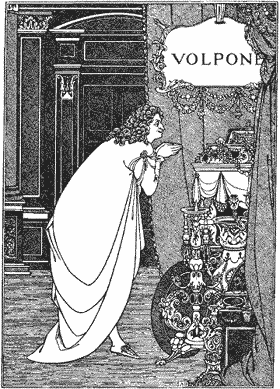| cypherpress | |
|
|

|
||
|
Prospectus for Volpone
Volpone was first brought out at the Globe Theatre
in 1605 and printed in quarto in 1607, after having been acted with
great applause at both Universities, and was republished by Jonson
in 1616 without alterations or additions. Volpone is undoubtedly
the finest comedy in the English language outside the works of Shakespeare.
Daring and forcible in conception, brilliant and faultless in execution,
its extraordinary merits have excited the enthusiasm of all critics.
The great French historian of English literature, Henri Taine, has
devoted to it some of the most splendid pages of his famous work.
“Volpone,” he exclaims, œuvre sublime, la plus vive peinture des mœurs du siècle, où s’étale la pleine beauté des convoitises méchantes, où la luxure, la cruauté, l’amour de l’or, l’impudeur de vice, déploient une poesie sinistre et splendide, digne d’une bacchanale du Titien. In none other of his plays, not even in The Alchemist,
in Bartholomew Fair, or in The Silent Woman, is Ben Jonson’s
prodigious intellect and ardent satirical genius so perfectly revealed
as in Volpone. The whole of Juvenal’s satires are not more
full of scorn and indignation than this one play, and the portraits
which the Latin poet has given us of the letchers, dotards, pimps
and parasites of Rome, are not drawn with a more passionate virulence
than the English dramatist has displayed in the portrayal of the
Venetian magnifico, his creatures and his gulls. Like Le Misanthrope,
Le Festin de Pierre, like L’Avare, Volpone might more fitly
be styled a tragedy, for the pitiless unmasking of the fox at the
conclusion of the play is terrible rather than sufficient. Volpone
is a splendid sinner and compels our admiration by the fineness
and very excess of his wickedness. We are scarcely shocked by his
lust, so magnificent is the vehemence of his passion, and we marvel
and are aghast rather than disgusted at his cunning and audacity.
As Mr. Swinburne observes, “there is something throughout of
the lion as well as the fox in this original and incomparable figure.” ¶ 1898. In addition to designing several full-page illustrations and numerous initial letters, Beardsley also intended to write an extended critical essay, by way of introduction to an edition of Volpone to be published by Leonard Smithers. Volpone proved to be Beardsley’s last work, however, and he had completed only a handful of the designs before his death. The book appeared posthumously, with Robert Ross’s “Eulogy of the Artist”; in the event, the essay was written by Vincent O’Sullivan. Smithers printed Beardsley’s perceptive notes on the play, together with the ravishing illustration of Volpone Adoring his Treasure, as a prospectus for the book. |
||
